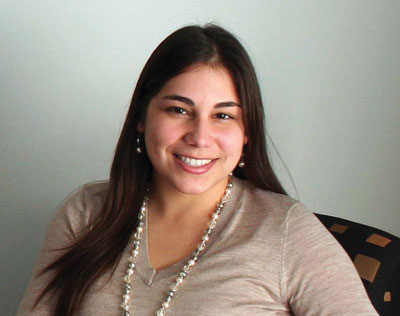As a doctoral student, Rosaura Orengo-Aguayo challenges herself to translate basic research into empirically-supported treatments for people in need of service.
Her proposed dissertation project epitomizes this mission.
Orengo-Aguayo, a Ph.D. student in clinical psychology at the University of Iowa, is testing the effectiveness of a new intervention method called Acceptance and Commitment Therapy (ACT). Her research will examine the effectiveness of ACT in reducing aggression and impulsivity and improving mental health outcomes among incarcerated domestic violence offenders.
Orengo-Aguayo and UI graduate students under her supervision are facilitating 12 ACT sessions for five groups of inmates at the Linn County Correctional Center in Cedar Rapids.

ACT is based on the idea that human suffering is universal and strives to promote behavior that is freely chosen, contextually controlled, and value based. Orengo-Aguayo and her colleagues encourage offenders to identify what gives their lives meaning and vitality, to notice their thoughts, feelings, and sensory experiences, and to move toward their values despite unwanted thoughts and feelings that show up along the way.
At the same time, Iowa Department of Corrections employees will be administering an intervention based on the Duluth Model to five control groups of inmates. The Duluth Model is a skills- and content-focused program in which offenders are held accountable for their thoughts and behaviors.
“The Iowa Department of Corrections has already expressed interest in disseminating this intervention (ACT) statewide if empirical support is obtained, making direct public policy impact attainable,” says Orengo-Aguayo, whose dissertation research is funded by the Society for the Psychological Study of Social Issues.
Orengo-Aguayo received a grant from the University of Iowa Injury Prevention Research Center to extend her data collection time and to obtain 3-month follow-up data, which is important in determining whether intervention gains are maintained after leaving jail. This grant supports graduate student and junior faculty research that focuses on the prevention of injuries in Iowa.
Coordinating this project has helped Orengo-Aguayo acquire key skills that will enhance her ability to compete in the job market. Orengo-Aguayo, a Dean’s Graduate Research Fellow and a 2007 UI SROP scholar, shares her insights about professional development and external funding:
Q: You earned a National Science Foundation (NSF) Graduate Research Fellowship and a National Academy of Sciences Ford Foundation Fellowship as a senior at the University of Puerto Rico, Rio Piedras. What advice do you have for students interested in such fellowships?
A: As a college senior, it’s your best chance of getting an NSF Fellowship because the committee members see you’re an undergraduate and are already thinking about external funding. You should do your proposal with your ideal school in mind and establish a partnership with the faculty member you are wanting to work with in graduate school. The NSF and Ford Foundation funds you based on your potential as a student.
Q: You’ve developed mutually-beneficial relationships with policy makers and government employees during this project. How did you establish this network and maintain these connections?
A: It all starts with a phone call. It’s that easy. You make a phone call and say, “I’m wondering how I can be of service to your agency.” I mentor a graduate student who is interested in implementing ACT for at-risk teenagers in Iowa City. I called the school’s guidance counselor and said we have workshops we can offer for free. We set up a meeting for a few weeks later and that turned into a massive project. This research isn’t just about us. We need to connect with people in our community first and assess their needs and how we can be of service. Then we can talk research.